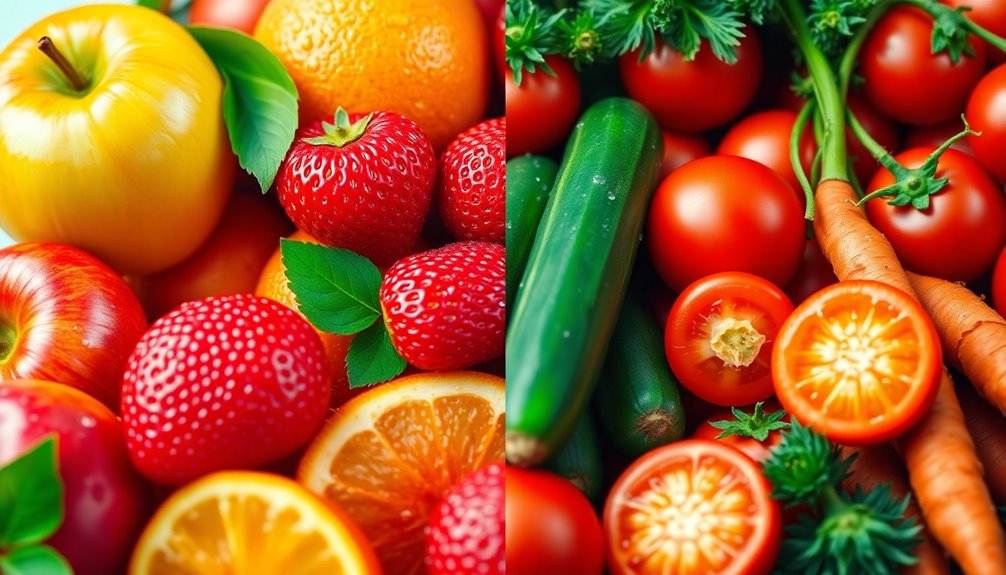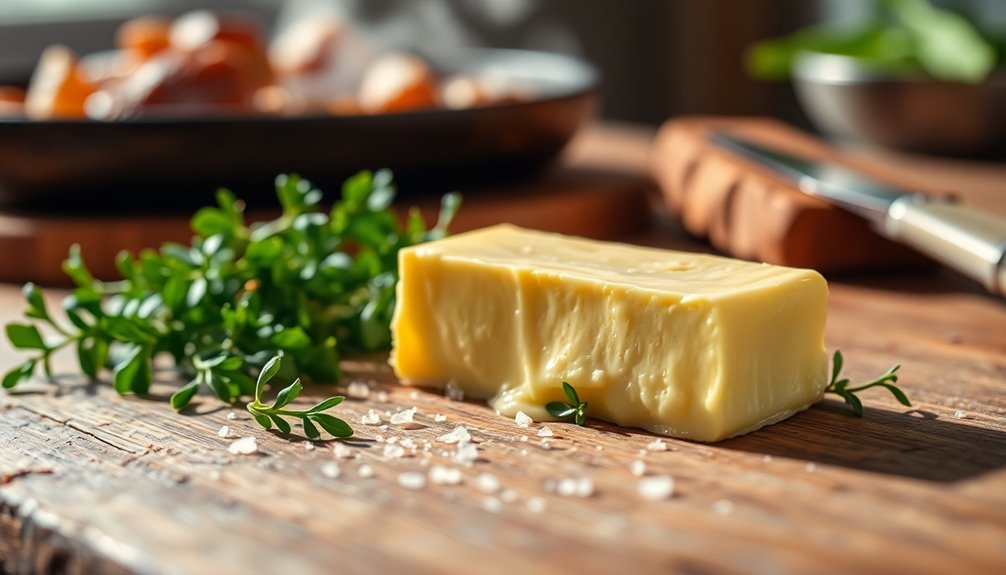Eating healthy fats can actually kickstart your weight loss journey and transform your body. When you include fats like olive oil and nuts in your diet, you help improve your metabolism and support fat-burning processes. Healthy fats keep you full longer, stabilize blood sugar, and can enhance insulin sensitivity. Plus, they play a crucial role in hormone regulation, which is vital for fat loss. By choosing the right types of fats, you can create a balanced diet that fuels your body effectively. Want to discover more strategies to maximize your fat loss?
Key Takeaways
- Consuming healthy fats, like olive oil and nuts, can enhance satiety and reduce overall calorie intake.
- Healthy fats support hormone regulation, improving fat metabolism and insulin sensitivity.
- Incorporate high-protein foods to promote muscle growth, which can further aid fat loss.
- Focus on high-fiber foods to stabilize blood sugar levels and enhance fullness, reducing cravings.
- Regular physical activity combined with a balanced intake of fats can optimize weight loss results.
Understanding Fat Metabolism

Understanding fat metabolism is crucial for anyone looking to manage their weight effectively. It all starts with fat digestion, which begins in your mouth and continues in your stomach. Lingual and gastric lipase enzymes break down fats, but the real action happens in the small intestine. Here, bile salts from your liver emulsify fats, turning them into smaller micelles. This makes them accessible to pancreatic lipase, which breaks down triglycerides into monoglycerides and free fatty acids.
Once digested, fatty acids and monoglycerides aggregate into micelles, allowing their absorption into your intestinal cells. Inside these cells, they're recombined into triglycerides and packaged with cholesterol into chylomicrons. These chylomicrons then enter your lymphatic system and eventually your bloodstream. The majority of lipid digestion occurs in the small intestine with pancreatic lipase, highlighting the importance of this enzyme in fat metabolism.
As your body needs energy, lipoprotein lipase breaks down chylomicrons in capillary walls, releasing fatty acids and glycerol into tissues. This distribution allows your body to use fats for energy.
When you need energy, fats stored in adipose tissue can be mobilized, ensuring you have a readily available source of fuel. Understanding this process can empower you to make informed dietary choices that support your weight management goals.
Hormonal Influence on Fat Loss

Fat loss isn't just about calorie counts or fat intake; hormones play a significant role in how your body manages weight. For instance, estrogen influences your metabolism by balancing fat distribution and insulin sensitivity. When estrogen levels drop, you might face insulin resistance, making weight gain more likely.
On the other hand, progesterone can slightly boost your calorie expenditure by raising your body temperature. Hormones regulate metabolism through various mechanisms, thus impacting your overall weight management.
Thyroid hormones, particularly T3 and T4, are vital for a healthy metabolic rate. Lower levels can slow your metabolism by 140 to 360 calories a day, hampering your fat loss efforts.
Growth hormone also plays a crucial role in regulating fat metabolism and preserving muscle mass.
Appetite-regulating hormones like leptin and ghrelin directly impact your hunger signals. If your leptin levels are off, you could struggle to manage your appetite effectively. Additionally, high cortisol levels may lead to increased fat storage, especially around your belly.
To optimize hormonal balance, focus on a healthy diet, regular exercise, adequate sleep, and stress reduction. By addressing these factors, you can improve how your hormones influence fat loss, setting the stage for a healthier body.
Dietary Strategies for Success

When it comes to achieving successful weight loss, focusing on dietary strategies can make all the difference. Start by prioritizing protein intake; aim for 25-35% of your daily calories from sources like lean meats, black beans, and lentils. These not only help preserve muscle mass but also keep you feeling fuller longer.
Next, don't shy away from healthy fats. Incorporate foods like olive oil, avocados, and nuts, aiming for 15-30% of your daily calories from these nutrient-dense options. They support satiety and nutrient absorption, making your meals more satisfying.
Carbohydrates also play a critical role. Opt for complex carbs, such as whole grains and fibrous vegetables, making sure they account for about 40-50% of your daily intake. High-fiber foods can help stabilize blood sugar levels and enhance fullness, as increasing fiber intake can protect against chronic health conditions.
Lastly, remember that there's no one-size-fits-all macronutrient ratio. Use a macros calculator to determine what works best for you, and adjust based on your body's response.
This personalized approach, combined with mindful eating practices, will set you on the path to achieving your weight loss goals.
Lifestyle Changes That Matter

Achieving lasting weight loss goes beyond just dietary strategies; it also involves making impactful lifestyle changes. Start by controlling your portion sizes. Use smaller plates to trick your mind into feeling satisfied with less food, and always portion out your snacks instead of eating directly from the package. Eating three nutritious meals a day, along with a small healthy snack, will keep you from overeating. Regular emotional development can also play a role in making healthier food choices and resisting cravings. Incorporating high-protein foods into your meals can also aid in satiety and help reduce overall calorie intake.
Stay hydrated to help curb your appetite. Drinking water before meals helps control hunger, so ditch sugary drinks for water or herbal tea. Staying hydrated can also prevent you from mistaking thirst for hunger, which is a common pitfall. Additionally, regular physical activity is crucial for maintaining overall health.
Regular physical activity is essential too; aim for at least 30 minutes of aerobic exercise most days, and incorporate strength training at least twice a week.
Establishing good habits is crucial. Schedule grocery trips and stick to a list to avoid impulse buys. Make sure every meal includes protein and fiber for lasting energy.
Lastly, close your kitchen two hours before bedtime to prevent late-night snacking. By adopting these lifestyle changes, you'll create a supportive environment for your weight loss journey and make lasting progress toward your goals.
Key Foods for Fat Loss

Incorporating key foods into your diet can significantly boost your fat loss efforts. Focus on high-protein options like lean meats, fish, eggs, skim milk, and turkey. These foods aren't only filling but also support muscle growth, essential for burning fat. Additionally, consider including Greek yogurt as it contains twice as much protein as regular yogurt, aiding in calorie burning during digestion. A well-balanced diet that includes essential nutrients is vital for overall health and can enhance your weight loss journey. Regular dental check-ups can help ensure your oral health supports healthy eating habits. Furthermore, following a low carbohydrate intake can complement your efforts in achieving low carb diets.
Don't forget fiber-rich foods. Quinoa, grapefruit, cruciferous vegetables like broccoli and kale, and spinach keep you satisfied while providing essential nutrients. Their low-calorie content makes them perfect for weight management. Including detoxifying juices can also complement your fiber intake and support overall wellness.
Metabolism-boosting foods are also crucial. Green tea can help burn abdominal fat, while cinnamon and ginger speed up your metabolism and improve digestion. Ginseng and turmeric further support weight loss by enhancing energy levels and reducing inflammation.
Incorporate foods with thermogenic effects, such as hot peppers, cucumbers, and avocados. Hot peppers can curb your appetite, while cucumbers are low in calories but high in water content, making them a great choice.
Remember that nuts can provide healthy fats in moderation, and boiled potatoes are highly filling, aiding in your weight management goals.
Health Benefits of Losing Fat

Losing fat brings a multitude of health benefits that can transform your life. By shedding excess weight, you can lower your blood pressure and significantly reduce your risk of heart disease. Improved insulin sensitivity helps manage type 2 diabetes, while lower levels of triglycerides and "bad" LDL cholesterol contribute to overall heart health.
You'll also decrease your risk of specific cancers, such as pancreatic and breast cancer.
On the physical side, you'll enjoy better mobility and reduced joint pain, making daily tasks like climbing stairs much easier. A good night's sleep becomes more attainable, cutting the risk of sleep apnea, and you'll notice a surge in energy levels that enhances physical performance. Increased energy levels allow you to engage more actively in daily activities and exercise routines.
Mentally and emotionally, losing fat can balance your mood and increase your self-esteem. As you release endorphins, you'll experience improved mental clarity and memory.
The social benefits are just as significant; you'll feel more confident in social situations and may even participate in new activities. Plus, adopting healthier eating habits can save you money in the long run.
Embrace the transformation; your body and mind will thank you!
Frequently Asked Questions
Can Eating Fat Really Help Me Lose Weight?
Yes, eating fat can help you lose weight, but it's all about the type of fat you consume.
Healthy fats, like those found in avocados and nuts, promote satiety, which means you'll feel fuller and may eat less overall. They also provide essential energy and can boost metabolism.
Just remember to balance your fat intake with proteins and carbs, and keep an eye on your overall calorie consumption for effective weight loss.
How Much Fat Should I Eat Daily for Weight Loss?
For weight loss, you should aim for 20-35% of your daily calories from fat.
If you're on a 1,500-calorie diet, that means eating about 33-58 grams of fat each day.
Focus on unsaturated fats like those from olive oil, avocados, and nuts, as they're healthier options.
Balancing your fat intake with carbohydrates and proteins is crucial for overall health, so don't eliminate fats completely; it can lead to nutrient deficiencies.
Are There Specific Fats That Are Better for Fat Loss?
Yes, some fats are better for fat loss than others. Focus on incorporating monounsaturated and polyunsaturated fats into your diet.
Foods like avocados, nuts, and fatty fish are excellent choices. They promote satiety, helping you feel full longer, which can reduce overall calorie intake.
Will I Gain Weight if I Eat More Healthy Fats?
You won't necessarily gain weight just by eating more healthy fats.
It's all about balance and portion control. Healthy fats can actually help you feel fuller longer, which may reduce your overall calorie intake.
However, if you overconsume calories from any source, including healthy fats, you might see weight gain.
Focus on moderation and incorporate healthy fats like avocados and nuts into a balanced diet for the best results.
How Quickly Can I Expect Results From This Approach?
You can expect to see results in a few weeks, but it really depends on your individual body and commitment.
Initially, you might notice changes in energy levels and mood as your body adjusts.
Within 4 to 6 weeks, you could see more noticeable weight loss, but remember, sustainable changes take time.
Stay consistent with your diet and exercise, and be patient; the best results often come with dedication and persistence.
Conclusion
Incorporating healthy fats into your diet can transform your body and boost fat loss. By understanding fat metabolism and the hormonal influences at play, you can make informed dietary choices and lifestyle changes that matter. Focus on key foods that support your goals, and you'll not only shed unwanted fat but also enjoy numerous health benefits. Embrace this simple trick, and watch as your body begins to change for the better. You've got this!










